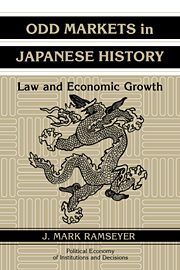Book contents
- Frontmatter
- Contents
- List of tables
- Series editors' preface
- Acknowledgments
- INTRODUCTION
- CHAPTER 1 LAW AND ECONOMIC GROWTH
- CHAPTER 2 PROPERTY: WATER AND LAND
- CHAPTER 3 EXTERNALITIES: SMOKE AND NOISE
- CHAPTER 4 MARKETS: CHILDREN
- CHAPTER 5 AUTONOMY: FAMILY LAW
- CHAPTER 6 PROMISSORY CREDIBILITY: SEX
- CHAPTER 7 CARTELS: COTTON SPINNING
- CHAPTER 8 CONCLUSIONS
- References
- Index
- POLITICAL ECONOMY OF INSTITUTIONS AND DECISIONS
CHAPTER 2 - PROPERTY: WATER AND LAND
Published online by Cambridge University Press: 21 September 2009
- Frontmatter
- Contents
- List of tables
- Series editors' preface
- Acknowledgments
- INTRODUCTION
- CHAPTER 1 LAW AND ECONOMIC GROWTH
- CHAPTER 2 PROPERTY: WATER AND LAND
- CHAPTER 3 EXTERNALITIES: SMOKE AND NOISE
- CHAPTER 4 MARKETS: CHILDREN
- CHAPTER 5 AUTONOMY: FAMILY LAW
- CHAPTER 6 PROMISSORY CREDIBILITY: SEX
- CHAPTER 7 CARTELS: COTTON SPINNING
- CHAPTER 8 CONCLUSIONS
- References
- Index
- POLITICAL ECONOMY OF INSTITUTIONS AND DECISIONS
Summary
INTRODUCTION
As the film Yojimbo opens, director Akira Kurosawa shows matinee idol Toshiro Mifune ambling past a ramshackle hut. A young man, apparently the son and heir apparent, dashes out of the cottage. Mifune watches bemused as the son yells at his father. Go on and eat your rice gruel, he shouts. My life may be shorter than yours, but it won't be half as dull. The father is unimpressed. Get back to farming, he replies. The life of a swordsman is not fit for you.
Nor, Kurosawa seems to tell us, is the life of a swordsman fit for many of us – or of much use to any of us. For at least one of the themes in Yojimbo is the Hobbesian inefficiency of it all. The mythic world of Yojimbo is a world where no public authority enforces private claims to any scarce resource, and no private parties cooperate without that authority. Instead, those with money dissipate their fortunes by hiring Mifune and his fellow mercenaries to protect their wealth and rob their neighbors.
Were the farmers and merchants in Yojimbo willing and able to cooperate, they could agree to respect each other's claims and fire these private armies. But agreements to cooperate often presuppose a public mechanism to enforce them. Notwithstanding game-theoretic models of the evolution of cooperation or of self-enforcing contracts, the merchants in Yojimbo defect whenever it pays – and it pays often.
- Type
- Chapter
- Information
- Odd Markets in Japanese HistoryLaw and Economic Growth, pp. 23 - 42Publisher: Cambridge University PressPrint publication year: 1996

